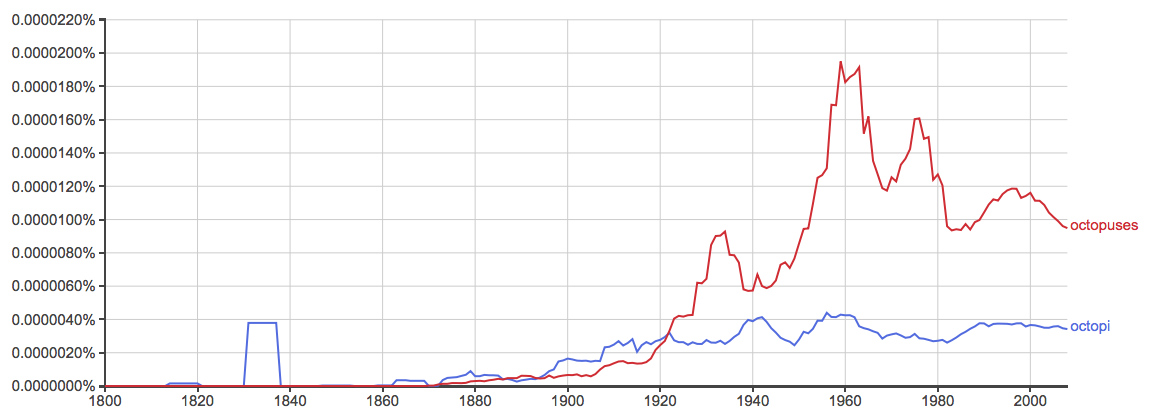English borrows many words from other languages. These words are called “loanwords.” Most are from Latin, French, and the Germanic languages, but some are borrowed from other sources.
Octopus is one of these loanwords, which adds to the confusion around its plural form. How do you form the plural of octopus? Some people follow the rule for regular plurals, and simply add -es. Others change the -us to -i, following the rule for some Latin plurals.
However, which plural form is correct? Read on to discover the difference between these two plural forms of the word octopus.
What is the Difference Between Octopuses and Octopi?
In this article, I will compare octopuses vs. octopi. I will use each in a sentence, and I will also discuss a useful trick to help you decide whether octopi or octopuses is correct for your writing.
When to Use Octopi
 What does octopi mean? Octopi is sometimes used as the plural of octopus. An octopus is a cephalopod mollusk of the order Octopoda. The word octopi refers to more than one of those animals.
What does octopi mean? Octopi is sometimes used as the plural of octopus. An octopus is a cephalopod mollusk of the order Octopoda. The word octopi refers to more than one of those animals.
Despite its relatively common usage, octopi is an improper plural. Latin words are sometimes pluralized with an -i, but octopus originates from Greek, not Latin.
As the Oxford English Dictionary states, the plural form octopi is mistakenly formed according to rules for Latin plurals, and is therefore incorrect.
Since octopus is Greek in origin, the classical Greek plural is octopodes, a form that is still occasionally used (but very rarely). The standard plural form in both American and British English has come to be octopuses, which has predominated for the last 100 years.
Octopi is a common mistake, and octopodes is seen as pedantic and would needlessly confuse your readers.
When to Use Octopuses
What does octopuses mean? Octopuses is the standard plural form of octopus. Over the years, it has become the accepted form in both American and British English and is used with much greater frequency than octopi.

The above chart graphs octopuses vs. octopi in English books since the year 1800, and, as you can see, ever since the early 1900s, octopuses has vastly predominated octopi.
Here are some examples of octopuses,
- Ten sharks battled 20 octopuses, and lost.
- The zoo housed otters, penguins, and octopuses.
- The brown octopus joined the black octopuses in the deep water.
- James Wood, a marine biologist and webmaster of The Cephalopod Page, is not surprised by Inky’s antics. In his many years of working with octopuses, he has seen many a great escape. –National Geographic
- A thorough evaluation of this data provided a clear conclusion: worldwide cephalopod populations have increased significantly since the 1950s. Cephalopods, an invertebrate group, include squid, octopuses, and cuttlefish. –Christian Science Monitor
Trick to Remember the Difference
 Here is a helpful trick for remembering octopi vs. octopuses.
Here is a helpful trick for remembering octopi vs. octopuses.
You should avoid using octopi, since it is incorrect.
You should also avoid using octopodes; since this classical Greek plural is almost never used in English, it is almost certain to confuse your readers.
Octopuses has become the accepted plural of octopus in modern English.
You can remember that octopi is incorrect since octopi ends in –i, and incorrect begins with that letter. This trick should help you when you can’t remember to use octopuses or octopi in your writing.
Summary
Is it octopuses or octopi? An octopus is a type of animal. Octopus is a loanword, which means it is a word borrowed from another language. In this case, the word octopus is a loanword from Greek.
- Octopi is a common mistake.
- Octopuses is the standard plural form of octopus.
Some writers use octopi to refer to more than one octopus. This pluralization follows a rule for forming plurals of Latin words. However, the word octopus is not of Latin origin, so this formation is not correct.
Octopuses follows the rule for regular plural nouns in English and has become the accepted plural of octopus in modern English. For this reason, you should use octopuses instead of octopi. Since octopi ends with -i and incorrect begins with i, you should have no trouble remembering whether octopuses or octopi is the right word to choose.
Contents
